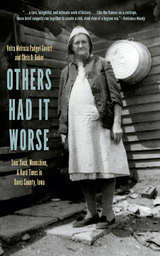3 books about Moonshine

From Moonshine To Madison Avenue
Cultural History Of The Nascar Winston Cup Series
Mark D. Howell
University of Wisconsin Press, 1997
NASCAR Winston Cup stock car racing is America’s fastest growing and most popular spectator sport. This book is a cultural and social reading of Winston Cup racing, the people who made the sport what it is today, and the corporations who sponsor the participants during their thirty-two race, ten-month quest for the national championship.
[more]

Moonshine
A Global History
Kevin R. Kosar
Reaktion Books, 2017
You might think moonshine only comes from ramshackle stills hidden away in the Appalachian Mountains, but the fact of the matter is we’ve been improvising spirits all around the world for centuries. No matter where you go, there is a local bootleg liquor, whether it’s bathtub gin, peatreek, or hjemmebrent. In this book, Kevin R. Kosar tells the colorful and, at times, blinding history of moonshine, a history that’s always been about the people: from crusading lawmen and clever tinkerers to sly smugglers and ruthless gangsters, from pontificating poets and mountain men to beleaguered day-laborers and foolhardy frat boys.
Kosar first surveys all the things we’ve made moonshine from, including grapes, grains, sugar, tree bark, horse milk, and much more. But despite the diversity of its possible ingredients, all moonshine has two characteristics: it is extremely alcoholic, and it is, in most places, illegal. Indeed, the history of DIY distilling is a history of criminality and the human ingenuity that has prevailed out of officials’ sights: from cleverly designed stills to the secret smuggling operations that got the goods to market. Kosar also highlights the dark side: completely unregulated, many moonshines are downright toxic and dangerous to drink. Spanning the centuries and the globe, this entertaining book will appeal to any food and drink lover who enjoys a little mischief.
Kosar first surveys all the things we’ve made moonshine from, including grapes, grains, sugar, tree bark, horse milk, and much more. But despite the diversity of its possible ingredients, all moonshine has two characteristics: it is extremely alcoholic, and it is, in most places, illegal. Indeed, the history of DIY distilling is a history of criminality and the human ingenuity that has prevailed out of officials’ sights: from cleverly designed stills to the secret smuggling operations that got the goods to market. Kosar also highlights the dark side: completely unregulated, many moonshines are downright toxic and dangerous to drink. Spanning the centuries and the globe, this entertaining book will appeal to any food and drink lover who enjoys a little mischief.
[more]

Others Had It Worse
Sour Dock, Moonshine, and Hard Times in Davis County, Iowa
Vetra Melrose Padget Covert and Chris D. Baker
University of Iowa Press, 2013
In 1977, while studying journalism at the University of Iowa, Chris Baker gave his grandmother a notebook and asked her to write about her childhood. Years later, long after her death in 1990, he found the tattered yellow notebook. In twenty-nine handwritten pages, the woman he knew as Grandma Covert had recorded her younger life in rural Iowa between 1920 and 1929. Writing about herself from the ages of four to thirteen, Vetra Covert sent a simple message back to her grandson: “That’s just the way it was. Others had it worse. We got by.”
Captivated by this glimpse of a woman very different from the more formidable grandmother of his memory, Chris Baker reframed Vetra’s journal to create a narrative of her childhood and a window into rural Iowa life in the 1920s. Transcribing her words into nine chapters that illuminate home, family, neighbors, school, and social life, he has composed a collection of candid, whimsical, sometimes ornery stories that will resonate with anyone who has ever tried to decipher the lives found in old letters and photos.
Vetra’s was not a romantic little-house-on-the-prairie childhood. She grew up with seven brothers and sisters (every new baby was “a supprise”) in a dilapidated log cabin near a small town now vanished from the Iowa map. Two rooms up, two rooms down, no plumbing, no electricity, holes in the roof and floor so big “you could of throwed a cat through them.” Her father was a bootlegger-farmer who measured his corn yield in gallons, not bushels, a moonshiner occasionally harassed by federal agents. Although family stories now present him as a quaint old-timer, the reality of living with him was much starker.
In his introduction to Vetra’s recollections, Chris Baker reveals the harsh truths underlying her authentic, uncomplaining account. By honoring her legacy, he discovered a newfound respect for her and for her family’s ability to survive despite the devastating forces of poverty, isolation, and the looming Great Depression. Together he and his grandmother have created an enduring chapter in family history.
[more]
READERS
Browse our collection.
PUBLISHERS
See BiblioVault's publisher services.
STUDENT SERVICES
Files for college accessibility offices.
UChicago Accessibility Resources
home | accessibility | search | about | contact us
BiblioVault ® 2001 - 2024
The University of Chicago Press









